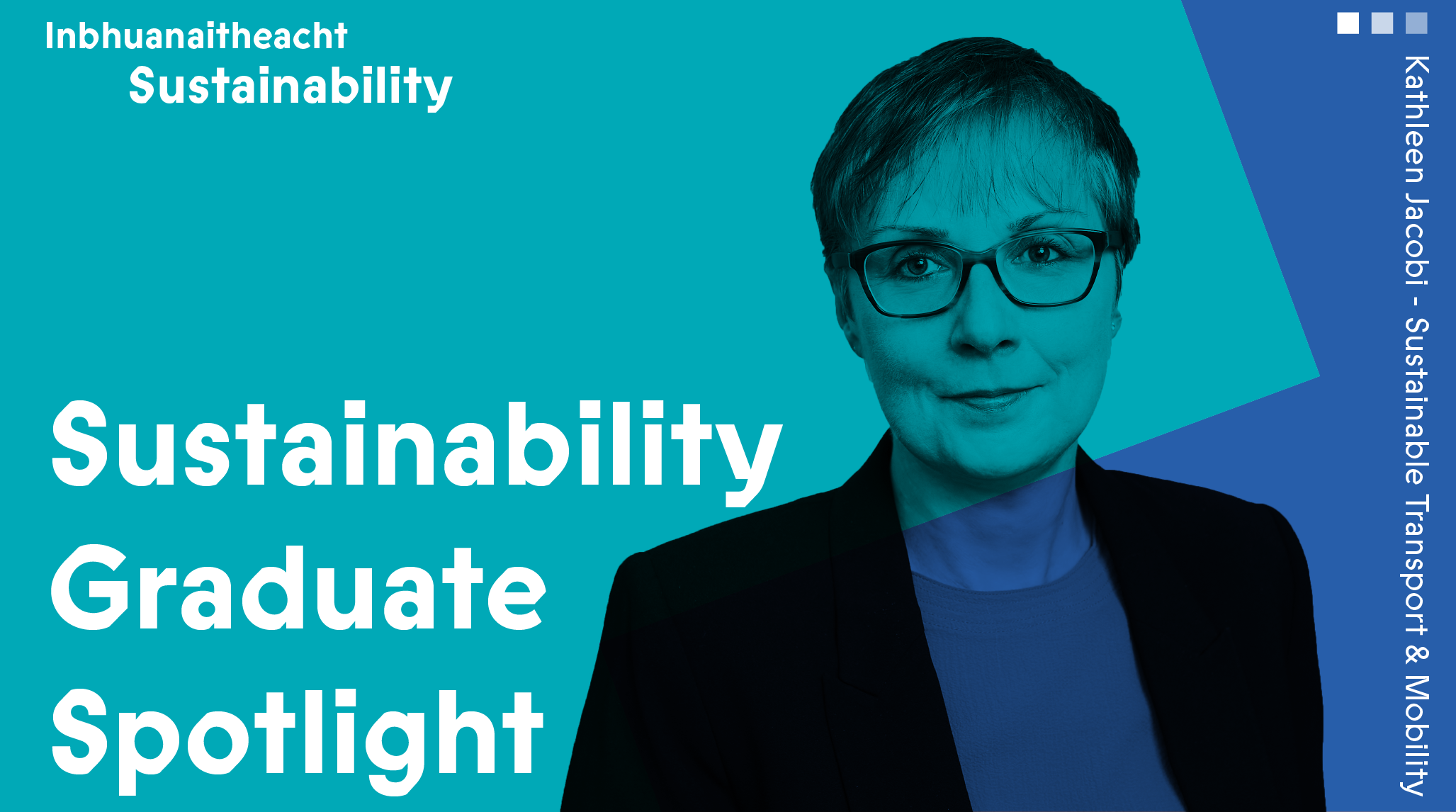Sustainability Graduate Spotlight - Kathleen Jacobi
Published:
The need for graduates who have the knowledge and skills to develop timely and practical solutions that address the United Nations (UN) Sustainable Development Goals (SDGs) is pressing.
As part of TU Dublin’s Strategic Intent to 2030, the University has an objective to establish a new generation of TU Dublin graduates who will lead the sustainability agenda with passion and purpose.
TU Dublin already offers prospective students a range of innovative sustainability focused programmes that address the global challenges set out in the UN SDGs. In support of our strategic objective, from September 2024 sustainability learning outcomes will be embedded within all programmes meaning that all TU Dublin graduates will receive sustainability education.
To inspire prospective students who are interested in working within the area of sustainability, the TU Dublin Sustainability Office, together with the Alumni Office, have developed a new Sustainability Graduate Spotlight series. The monthly showcase aims to celebrate TU Dublin and former DIT graduates who are leading on and advancing the sustainability agenda as part of their work within industry or within the community.

This month, we are focusing on SDG 5: Gender Equality, and SDG 9: Industry, Innovation and Infrastructure, shining a spotlight on TU Dublin graduate Kathleen Jacobi. In 2022, after two years of study, Kathleen achieved a Master of Science degree in TU226 Sustainable Transport and Mobility, which is a joint programme co-delivered between the School of Civil & Transport Engineering and the School of Architecture, Building and Environment.
Kathleen Jacobi
Kathleen is leading an exciting and purposeful career within the area of sustainable and active travel and mobility. She is currently the Sustainability Portfolio Coordinator of Transport Infrastructure Ireland (TII), a state agency providing national road, cycling, and light rail infrastructure and services in the Republic of Ireland. Kathleen is also a member of the ‘Research in Mobility’ Committee and ‘Diversity & Inclusion’ Working Group within UITP (The International Association of Public Transport), and the European Commission’s Ambassadors for Diversity in Transport Network.
Educational Experience
Earlier this month we caught up with Kathleen to learn more about her career choices and why she chose her areas of study. Kathleen told us that she had already completed a BEng (Hons) in Structural Engineering in Germany in 1995, and then worked as a structural engineer mainly on residential construction projects in Germany for several years. Since 2008 she has been working in various roles on Luas, the light rail system in Dublin. Then in 2019 TU Dublin promoted the course and its benefits to TII and subsequently TII decided to sponsor three members of staff to undertake the masters course. Kathleen was one of the people whose application was successful and she told us that this was “a great opportunity to get a degree reflecting my experience working in public transport to date, and expand my knowledge and skills with a focus on sustainability.”
Applying new Skills and Knowledge
When asked about what key skills or learnings she obtained from the masters in Sustainable Transport and Mobility, Kathleen described that she gained a deep understanding of gender and equity issues in transport and mobility, and society in general. She added that she applied those new learnings when she later went on to build on the ‘Travelling in a Woman’s Shoes’ study which was published by TII in 2020.
Kathleen is currently applying the knowledge and insights obtained from the course and her dissertation to a TII research project which explores what it takes to empower women in Ireland to choose cycling as a mode of transport. A recently completed project she worked on was All Aboard: TII's Accessibility Podcast, which was developed to provide a platform for designers, advocates and researchers to share insights on accessible public transport, and how they have incorporated accessibility in their work. Their insights are enriched by the stories and lived experiences of people with disabilities, their family members, and carers. The podcast team engaged with TU Dublin Visual Communication students on the artwork for the podcast, and amongst the interviewees was Dr Lorraine D’Arcy, TU Dublin’s Sustainability Action Research & Innovation Lead.
Kathleen’s main focus is on achieving the targets set out in Ireland’s Climate Action Plan (CAP). The CAP requires all public sector bodies, including TII, to continue delivering infrastructure and services for the public while simultaneously reducing greenhouse gas emissions (GHG). Kathleen described that “this includes the reduction of direct GHG emissions generated from sources owned or controlled by TII (scope 1) and indirect GHG emissions generated by the purchase of electricity (scope 2)”, adding that “for TII these emissions only account for about 1% of total GHG emissions”.
Kathleen says that “the gathering, recording and assessing data, and identifying opportunities to reducing indirect GHG emissions which are a consequence of TIIs activities but occur from sources not owned or controlled by TII (scope 3) is an enormous and very complex challenge that TII works on addressing for all activities across the organisation.”
If you are interested to learn more about TII’s first Climate Action Roadmap, read their December 2022 publication.
#TUDublinSustainability
The concept of sustainability can mean many different things to different people, and understanding what Sustainability at TU Dublin means our people and our network is a great starting point as we work to establish TU Dublin as one of the most sustainable universities in the world. When we asked Kathleen what #TUDublinSustainability means to her, Kathleen replied:
“To me #TUDublinSustainability means equipping students with the knowledge and skills needed to respond to the climate crisis and ensure a just transition to climate neutrality.”
